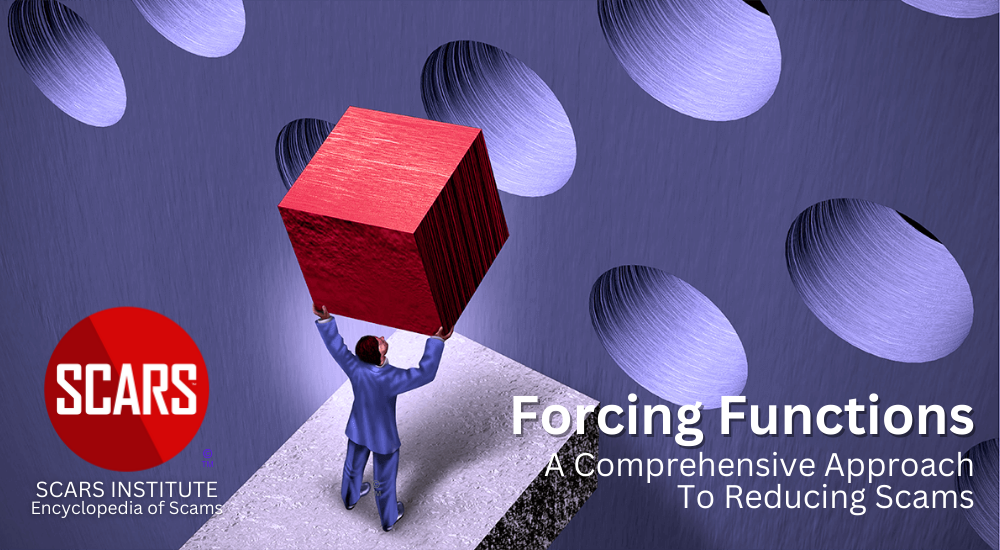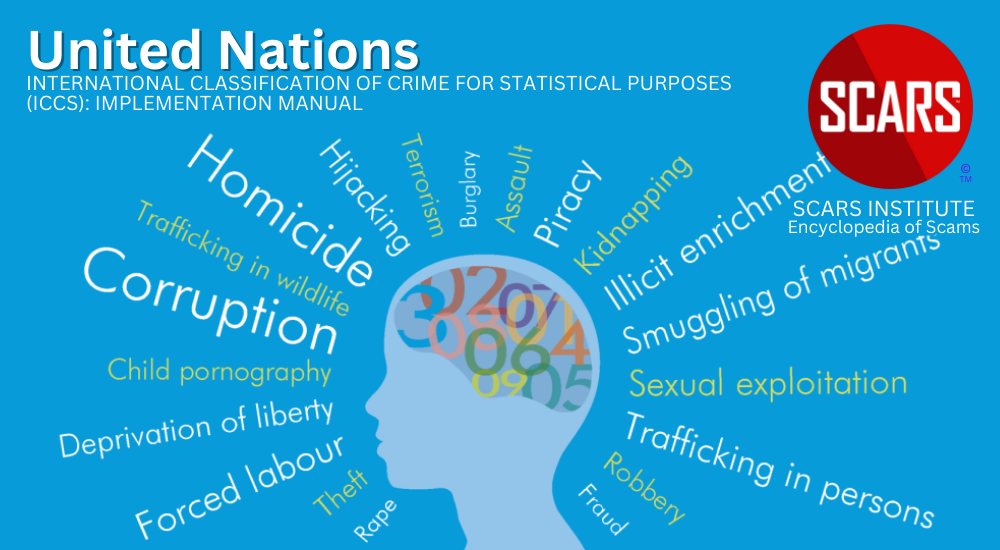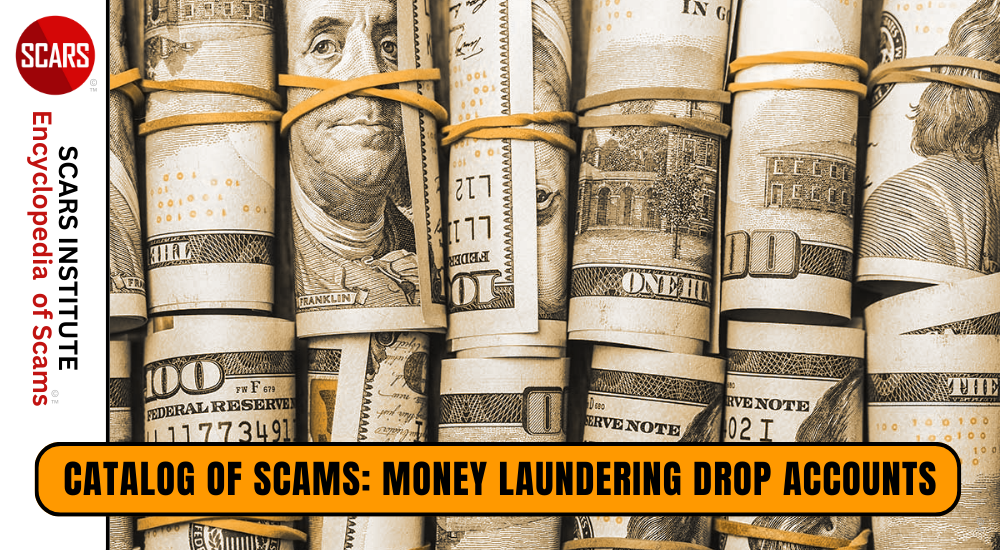
SCARS Institute’s Encyclopedia of Scams™ Published Continuously for 25 Years

United Nations New Crime Classification System for Crime Including Scams Fraud and Cybercrimes
The United Nations Office on Drugs and Crime Releases Their New: International Classification of Crime for Statistical Purposes (ICCS): Implementation Manual
Presented by the SCARS Institute
Authors:
• SCARS Institute Encyclopedia of Scams Editorial Team – Society of Citizens Against Relationship Scams Inc.
• United Nations Office on Drugs and Crime (UNODC)
Article Abstract
The ICCS Implementation Manual 2025, released by the United Nations Office on Drugs and Crime, provides a comprehensive classification system for scams, fraud, and cybercrime, enabling law enforcement, financial institutions, and policymakers to better detect, prevent, and prosecute these crimes. The manual categorizes fraud into sections covering general financial fraud, online scams, identity theft, bribery, and money laundering, while also distinguishing cyber-enabled crimes (such as phishing and social engineering) from cyber-dependent crimes (such as hacking and ransomware attacks).
Recognizing the global nature of fraud and cybercrime, the ICCS system helps standardize data collection, improve international cooperation, and enhance real-time information sharing between jurisdictions. It highlights challenges in tracking scams, such as differences in national laws, evolving fraud tactics, and underreporting by victims, and proposes AI-driven fraud detection, stronger financial regulations, and delayed transaction approvals for high-risk payments as countermeasures.
The manual (below) also emphasizes the importance of public awareness campaigns and harsher penalties for convicted fraudsters. Ultimately, the ICCS framework seeks to modernize global crime classification, improve enforcement strategies, and strengthen financial and digital security in an era of increasingly sophisticated cyber threats.

The United Nations Office on Drugs and Crime Releases Their New: International Classification of Crime for Statistical Purposes (ICCS): Implementation Manual
The ICCS Implementation Manual 2025 provides a detailed framework for classifying and analyzing crimes, including scams, fraud, and cybercrime. Below is a comprehensive summary of the sections relevant to these topics:
The Benefit of the ICCS Categorization System
The real benefit of the ICCS classification system for scams, fraud, and cybercrime lies in its ability to create a universal, standardized framework for identifying, reporting, and combating these crimes across different jurisdictions. Fraud and cybercrime are inherently global issues, often involving perpetrators, victims, and financial systems in multiple countries. Without a consistent classification system, law enforcement agencies, financial institutions, and regulatory bodies struggle to share intelligence, track criminal trends, and enforce legal actions effectively. By categorizing scams, fraud, and cybercrime into clear, well-defined segments, the ICCS system enables better data collection, trend analysis, and international cooperation, allowing authorities to identify emerging threats, coordinate investigations, and allocate resources efficiently. Additionally, this structured approach improves public awareness and victim support by clearly defining different types of scams and fraud, helping consumers recognize and avoid deception. Ultimately, the ICCS classification system strengthens global crime prevention efforts, enhances legal enforcement, and ensures more effective policymaking in the fight against financial and digital crime.
Overview of Fraud, Scams, and Cybercrime in the ICCS Framework
The manual classifies fraud, scams, and cybercrime under Acts Involving Fraud, Deception, or Corruption (ICCS Section 07). It recognizes these as crimes that involve deception with the intent to secure financial or personal gain.
Classification of Fraud and Scams
The manual categorizes various fraudulent activities, including:
-
-
- General Fraud – The use of deceit to obtain money or property.
- Internet Fraud – Scams conducted online, including phishing, fake investment opportunities, and romance scams.
- Embezzlement – Misappropriation of funds by someone in a position of trust, both in the public and private sectors.
- Money Laundering – Concealing the origins of illegally obtained money.
- Bribery and Corruption – Including both active and passive bribery, particularly in financial and political environments.
-
The manual underscores that scams have evolved significantly due to technological advancements, with criminals leveraging digital platforms to commit fraud at an unprecedented scale.
Cybercrime and Technology-Enabled Fraud
Cybercrime is categorized separately as Acts Against Computer Systems (ICCS 0903). The manual makes a distinction between:
-
-
- Cyber-Enabled Crimes – Traditional crimes facilitated by digital technology, such as online fraud, identity theft, and cyberstalking.
- Cyber-Dependent Crimes – Offenses that specifically target computer systems, such as hacking, ransomware, and denial-of-service (DoS) attacks.
-
Key elements of cybercrime classification include:
-
-
- Hacking and Unlawful Access – Unauthorized entry into digital systems.
- Malware and Ransomware Attacks – Programs designed to damage or control systems.
- Phishing and Social Engineering – Fraudulent tactics to extract personal or financial information.
- Attacks on National Infrastructure – Including sabotage of governmental or corporate digital assets.
-
The manual also emphasizes the importance of real-time detection and preventative measures, urging governments and private institutions to collaborate on cybersecurity initiatives.
Data Collection and Statistical Challenges
The manual discusses the challenges of recording and categorizing fraud and cybercrime, given their cross-border nature. Key issues include:
-
-
- Variability in National Laws – Different legal definitions of fraud and scams across countries.
- Evolving Scam Tactics – Constantly changing fraud methods that evade detection.
- Difficulties in Victim Identification – Many victims do not report scams due to embarrassment or lack of legal awareness.
-
To address these issues, the manual recommends:
-
-
- Developing uniform reporting standards for financial institutions and tech companies.
- Enhancing real-time information sharing among law enforcement agencies.
- Applying AI-driven fraud detection systems.
-
Legal and Law Enforcement Responses
The manual highlights international efforts to combat scams and cybercrime, including:
-
-
- Fast-tracking prosecution of scammers – Establishing dedicated cybercrime courts.
- Public registries of convicted fraudsters – Similar to sex offender lists, to deter repeat offenders.
- Cross-border collaboration – Enhancing law enforcement cooperation to track and arrest international scam networks.
-
Recommended Countermeasures
The ICCS manual outlines several strategies for reducing fraud and scams, including:
-
-
- Stronger Financial Regulations – Implementing mandatory fraud verification for large transactions.
- Improved Public Awareness – Running global scam-awareness campaigns.
- AI-Based Scam Detection – Monitoring digital communications for scam indicators.
- Delayed Transaction Approvals for High-Risk Payments – Adding verification steps before processing suspicious transactions.
- Harsher Financial Penalties for Fraudsters – Seizing assets and imposing heavy fines on convicted scammers.
-
The Future of Fraud and Cybercrime Prevention
The manual concludes by stressing the need for continuous adaptation in fraud prevention, as criminals constantly develop new tactics. It advocates for a global, technology-driven approach that integrates AI, financial oversight, and legal enforcement to stay ahead of emerging threats.
Classification System as Applies to Scams Fraud and Cybercrime
Categorization of Scams, Fraud, and Cybercrimes (ICCS Implementation Manual 2025)
The ICCS Implementation Manual 2025 classifies scams, fraud, and cybercrimes under various sections, emphasizing their evolving nature and the necessity for standardized categorization for law enforcement and statistical tracking. Below is the categorization:
1. Fraud and Scams (ICCS Section 07: Acts Involving Fraud, Deception, or Corruption)
This category includes offenses involving deception, misrepresentation, and financial exploitation.
A. General Fraud
-
-
- Financial Fraud – Deceptive practices used to gain financial advantage.
- Insurance Fraud – Falsifying claims to receive undue insurance payouts.
- Credit Card Fraud – Unauthorized use of financial accounts for personal gain.
- Loan and Banking Fraud – Fraudulent activities involving loans, mortgages, or banking services.
-
B. Investment and Business Scams
-
-
- Ponzi and Pyramid Schemes – Fraudulent investment schemes promising high returns.
- Securities and Stock Market Fraud – Manipulating stock prices, insider trading, and false investment offerings.
- Fake Business and Franchise Scams – Fraudulent business proposals or non-existent franchises.
-
C. Online and Social Scams
-
-
- Romance Scams – Exploiting emotional relationships for financial gain.
- Lottery and Sweepstakes Scams – Fake prize notifications requiring upfront payments.
- Charity and Disaster Relief Scams – Fraudulent solicitations for fake charitable causes.
-
D. Identity and Employment Fraud
-
-
- Identity Theft – Unauthorized use of personal information for financial gain.
- Fake Job Scams – False employment offers requiring upfront payments or identity documents.
- Resume and Credential Fraud – Misrepresentation of qualifications for personal gain.
-
E. Bribery and Corruption
-
-
- Public Sector Corruption – Bribery, embezzlement, or abuse of power by government officials.
- Private Sector Corruption – Fraudulent practices in business settings, such as kickbacks or insider deals.
- Money Laundering – Concealing the origins of illegally obtained money.
-
2. Cybercrime and Technology-Enabled Fraud (ICCS Section 09: Acts Against Computer Systems)
Cybercrime includes offenses that target or use digital systems to facilitate fraud or deception.
A. Cyber-Enabled Financial Crimes
-
-
- Online Banking Fraud – Hacking or phishing to gain access to financial accounts.
- Cryptocurrency Fraud – Fake investment schemes, Ponzi schemes, or scams involving digital currencies.
- E-commerce Fraud – Selling fake products or non-delivery of purchased goods online.
-
B. Phishing, Social Engineering, and Digital Fraud
-
-
- Phishing Attacks – Fraudulent emails, texts, or phone calls to steal personal data.
- Business Email Compromise (BEC) – Impersonation of executives to manipulate financial transactions.
- Deepfake and AI-Based Scams – Manipulated audio or video content used for fraud.
-
C. Hacking and Unauthorized Access
-
-
- Unauthorized Data Access (Hacking) – Illegally accessing personal, corporate, or governmental digital systems.
- Ransomware Attacks – Encrypting digital assets and demanding payment for decryption keys.
- Denial-of-Service (DoS) Attacks – Disrupting websites, networks, or services through excessive traffic.
-
D. Cyberstalking and Digital Harassment
-
-
- Online Harassment and Cyberbullying – Using digital platforms to intimidate or threaten individuals.
- Doxxing – Publishing private information online with malicious intent.
- Revenge Porn and Sextortion – Exploiting personal media for financial or emotional manipulation.
-
E. Crimes Against Critical Infrastructure
-
-
- Cyber Attacks on National Security Systems – Targeting government networks, defense systems, or power grids.
- Corporate Espionage and Data Breaches – Theft of trade secrets or unauthorized leaks of sensitive data.
-
3. Legal and Regulatory Crimes Related to Fraud and Cybercrime
These offenses involve legal violations that facilitate fraud or cybercrime.
A. Facilitating Fraud and Financial Crimes
-
-
- Running or Managing a Fraudulent Organization – Operating large-scale scam networks.
- Producing or Distributing Counterfeit Goods – Selling fake luxury goods, pharmaceuticals, or electronics.
- Use of Shell Companies for Fraud – Hiding illicit activities behind false business entities.
-
B. Impersonation and False Representation
-
-
- Impersonating Law Enforcement or Officials – Using fake credentials to commit fraud.
- Fake Tech Support Scams – Pretending to offer technical assistance to gain financial access.
- False Representation of a Licensed Professional – Fraudulently posing as doctors, lawyers, or other professionals.
-
C. Digital Money Laundering and Underground Markets
-
-
- Dark Web Marketplaces – Online platforms for selling illegal goods and services.
- Crypto Money Laundering – Using digital currencies to launder illicit funds.
- Fake Payment Processing Services – Setting up fraudulent payment gateways to facilitate scams.
-
4. Cross-Border and Organized Crime Elements
Some scams and fraud schemes involve international operations and organized crime networks.
A. Transnational Fraud and Scam Networks
-
-
- International Money Mule Operations – Using unsuspecting individuals to launder money.
- Call Center-Based Scam Operations – Fraud rings operating fake customer support centers.
- Cross-Border Romance and Inheritance Scams – Scams that exploit international victims.
-
B. Links to Organized Crime
-
-
- Ties Between Fraud Rings and Criminal Organizations – Links between fraud groups and larger crime syndicates.
- Human Trafficking and Scam Labor – Coercing individuals to work in scam call centers.
- Terrorist Financing Through Fraud – Using fraud to fund extremist activities.
-
Conclusion
The ICCS Implementation Manual 2025 provides a detailed classification of scams, fraud, and cybercrimes, distinguishing between traditional financial fraud, cyber-enabled fraud, technology-based crimes, and cross-border criminal activities.
These categorizations help law enforcement, policymakers, and financial institutions develop targeted strategies to detect, prevent, and prosecute fraudulent activities. The manual emphasizes the need for global cooperation, enhanced technology, and stronger regulations to combat the ever-evolving landscape of scams and cybercrime.
By standardizing fraud classification and implementing technology-driven countermeasures, it aims to enhance global crime prevention and victim protection.
International Classification of Crime for Statistical Purposes (ICCS): Implementation Manual
-/ 30 /-
What do you think about this?
Please share your thoughts in a comment below!
Table of Contents
LEAVE A COMMENT?
Recent Comments
On Other Articles
- Arwyn Lautenschlager on Love Bombing And How Romance Scam Victims Are Forced To Feel: “I was love bombed to the point that I would do just about anything for the scammer(s). I was told…” Feb 11, 14:24
- on Dani Daniels (Kira Lee Orsag): Another Scammer’s Favorite: “You provide a valuable service! I wish more people knew about it!” Feb 10, 15:05
- on Danielle Delaunay/Danielle Genevieve – Stolen Identity/Stolen Photos – Impersonation Victim UPDATED 2024: “We highly recommend that you simply turn away form the scam and scammers, and focus on the development of a…” Feb 4, 19:47
- on The Art Of Deception: The Fundamental Principals Of Successful Deceptions – 2024: “I experienced many of the deceptive tactics that romance scammers use. I was told various stories of hardship and why…” Feb 4, 15:27
- on Danielle Delaunay/Danielle Genevieve – Stolen Identity/Stolen Photos – Impersonation Victim UPDATED 2024: “Yes, I’m in that exact situation also. “Danielle” has seriously scammed me for 3 years now. “She” (he) doesn’t know…” Feb 4, 14:58
- on An Essay on Justice and Money Recovery – 2026: “you are so right I accidentally clicked on online justice I signed an agreement for 12k upfront but cd only…” Feb 3, 08:16
- on The SCARS Institute Top 50 Celebrity Impersonation Scams – 2025: “Quora has had visits from scammers pretending to be Keanu Reeves and Paul McCartney in 2025 and 2026.” Jan 27, 17:45
- on Scam Victims Should Limit Their Exposure To Scam News & Scammer Photos: “I used to look at scammers photos all the time; however, I don’t feel the need to do it anymore.…” Jan 26, 23:19
- on After A Scam, No One Can Tell You How You Will React: “This article was very informative, my scams happened 5 years ago; however, l do remember several of those emotions and/or…” Jan 23, 17:17
- on Situational Awareness and How Trauma Makes Scam Victims Less Safe – 2024: “I need to be more observant and I am practicing situational awareness. I’m saving this article to remind me of…” Jan 21, 22:55
ARTICLE META
Important Information for New Scam Victims
- Please visit www.ScamVictimsSupport.org – a SCARS Website for New Scam Victims & Sextortion Victims
- Enroll in FREE SCARS Scam Survivor’s School now at www.SCARSeducation.org
- Please visit www.ScamPsychology.org – to more fully understand the psychological concepts involved in scams and scam victim recovery
If you are looking for local trauma counselors please visit counseling.AgainstScams.org or join SCARS for our counseling/therapy benefit: membership.AgainstScams.org
If you need to speak with someone now, you can dial 988 or find phone numbers for crisis hotlines all around the world here: www.opencounseling.com/suicide-hotlines
A Note About Labeling!
We often use the term ‘scam victim’ in our articles, but this is a convenience to help those searching for information in search engines like Google. It is just a convenience and has no deeper meaning. If you have come through such an experience, YOU are a Survivor! It was not your fault. You are not alone! Axios!
A Question of Trust
At the SCARS Institute, we invite you to do your own research on the topics we speak about and publish, Our team investigates the subject being discussed, especially when it comes to understanding the scam victims-survivors experience. You can do Google searches but in many cases, you will have to wade through scientific papers and studies. However, remember that biases and perspectives matter and influence the outcome. Regardless, we encourage you to explore these topics as thoroughly as you can for your own awareness.
Statement About Victim Blaming
SCARS Institute articles examine different aspects of the scam victim experience, as well as those who may have been secondary victims. This work focuses on understanding victimization through the science of victimology, including common psychological and behavioral responses. The purpose is to help victims and survivors understand why these crimes occurred, reduce shame and self-blame, strengthen recovery programs and victim opportunities, and lower the risk of future victimization.
At times, these discussions may sound uncomfortable, overwhelming, or may be mistaken for blame. They are not. Scam victims are never blamed. Our goal is to explain the mechanisms of deception and the human responses that scammers exploit, and the processes that occur after the scam ends, so victims can better understand what happened to them and why it felt convincing at the time, and what the path looks like going forward.
Articles that address the psychology, neurology, physiology, and other characteristics of scams and the victim experience recognize that all people share cognitive and emotional traits that can be manipulated under the right conditions. These characteristics are not flaws. They are normal human functions that criminals deliberately exploit. Victims typically have little awareness of these mechanisms while a scam is unfolding and a very limited ability to control them. Awareness often comes only after the harm has occurred.
By explaining these processes, these articles help victims make sense of their experiences, understand common post-scam reactions, and identify ways to protect themselves moving forward. This knowledge supports recovery by replacing confusion and self-blame with clarity, context, and self-compassion.
Additional educational material on these topics is available at ScamPsychology.org – ScamsNOW.com and other SCARS Institute websites.
Psychology Disclaimer:
All articles about psychology and the human brain on this website are for information & education only
The information provided in this article is intended for educational and self-help purposes only and should not be construed as a substitute for professional therapy or counseling.
While any self-help techniques outlined herein may be beneficial for scam victims seeking to recover from their experience and move towards recovery, it is important to consult with a qualified mental health professional before initiating any course of action. Each individual’s experience and needs are unique, and what works for one person may not be suitable for another.
Additionally, any approach may not be appropriate for individuals with certain pre-existing mental health conditions or trauma histories. It is advisable to seek guidance from a licensed therapist or counselor who can provide personalized support, guidance, and treatment tailored to your specific needs.
If you are experiencing significant distress or emotional difficulties related to a scam or other traumatic event, please consult your doctor or mental health provider for appropriate care and support.
Also read our SCARS Institute Statement about Professional Care for Scam Victims – click here to go to our ScamsNOW.com website.















